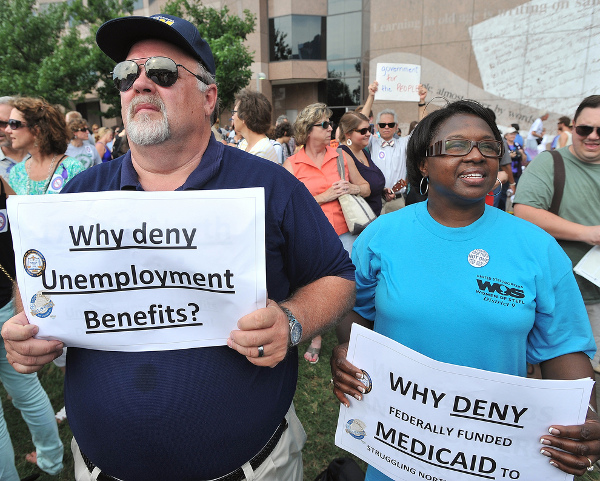
PHOTO/USW PHOTO
GREENSBORO, NC—North Carolina’s racially integrated Moral Monday protests are continuing—and have taken a new form, their day in court.
Last summer, thousands of North Carolina residents showed up every Monday at the state capitol to protest laws that the Tea Party-dominated Republican Party was pushing rapidly through the legislature —acts aimed at cutting services for the poor and most vulnerable, attacking women’s reproductive rights, and restricting voting.
Calling themselves the Moral Monday movement, week after week numbers of protestors refused to leave the building and eventually some 924 were arrested.
Now Wake County District Attorney C. Colon Willoughby, Jr., has offered to dismiss the charges against them in exchange for 25 hours in community service and $180 in court costs. So far only about 50 have accepted the offer—the rest want their day in court.
The North Carolina Chapter of the NAACP has been working to secure free legal counsel, pulling together a volunteer defense network of more than 100 people.
Reverend William Barber II, a major voice in the protests, was arrested with 12 others in the first Moral Monday in April. Charged with second-degree trespassing and failure to disperse, he went to trial in late October. His case has been continued, and trials were slated to resume in early December.
“They want to criminalize constitutional rights and the constitutional right to peaceful and non-violent protests,” said Barber, regarding his arrest and trial. “None of what we have done has been in the dark. Everybody knows it’s not rooted in any form of violence, but in the deepest tradition of the non-violence history of our country and our movement.”
Scott Holmes, a Durham defense attorney representing some of the protesters, asks, “Why would a protester in general want a trial? Because their civil disobedience not only brings light to their political issues, but it also is an opportunity to preserve the freedom of speech in a court of law. Because if we don’t fight for it, it disappears.”
Roughly 95 percent of the cases in the North Carolina court system are resolved through plea-bargaining, so the unusually large number of arrestees wanting their fair trial is overwhelming the courts.
Indeed, the Moral Monday protest cases highlight a real problem in the court system: it “settles” most cases instead of taking them to trial. “The number of people asking for a trial in these cases is unprecedented in Wake County,” says Holmes, who is director of the Civil Litigation Law Clinic at N.C. Central University. “It really shows how our system of criminal justice is built around people pleading guilty. If a majority of people asked for a trial, it would be like a government shutdown.”
Meanwhile, Moral Monday actions continue around the state, uniting North Carolinians across gender, religious, and—above all—racial lines, a major breakthrough in the South, where the powers-that-be have historically divided the 99 percent by setting Black and white against each other and both against immigrants.
